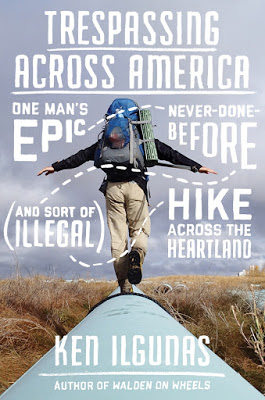
Something that fascinates me about America is the fact that there is more land without people than there is with people. It’s easy to get bogged down in the mire of the ever-raging political battles and America’s position on the global stage, but the true spirit of the U.S. lies in its uninhabited wild spaces.
But despite being wild and open, much of the privately-owned land is not open to hikers. When Ken Ilgunas set out on a 1700-mile walk from Alberta to Texas in 2012, following the proposed route of the Keystone XL oil pipeline, most of his journey took him across “No Trespassing” land.
As Ilgunas explains, walking across wild America is difficult unless you’re either in a national park or on a trail approved by the government — “In America, the so-called freest country on earth, no one really has the right to roam” (Ilgunas, 2016).
It’s quite bizarre when you consider that other parts of the world, such as Germany, Denmark, Switzerland and Scandinavian countries, allow hikers to walk across unenclosed countryside without hindrance. In Sweden, he says, they take it one step further: allemansrätten (every man’s right) means that everyone must have access to nature, with the exception of private gardens, in the immediate vicinity of dwellings and on cultivated land. Putting up a “no trespassing” sign can actually be considered a legal violation of allemansrätten unless it’s necessary to keep hikers away from a place where they really shouldn’t be walking.
Encountering ghost towns, herds of stampeding cattle and countless warnings of “you’ll be shot if you walk across so-and-so’s land”, Ken Ilgunas writes with great humour about the trials and the beauty of walking across America’s heartland. Despite the threatening presence of “no trespassing” warnings, Ilgunas recounts the many kindnesses that he was given by people he met along his route. He was treated with compassion by the majority of people that he met, and a few weeks into his journey, he realized that “his cynicism […] was breaking apart and dissipating like one of these prairie clouds after a thundershower”.
The size and scale of the places he walked through has to be witnessed first-hand to be appreciated. But Ilgunas’s book paints a detailed picture for the reader. He writes about the sheer magnitude of the rolling prairies; miles and miles of wild, open land. His description of the vastness of the Great Plains sky is particularly noteworthy, likening it to a “great blue dome“, “a Sistine ceiling“, “a vast ever-changing sky painting” above him.
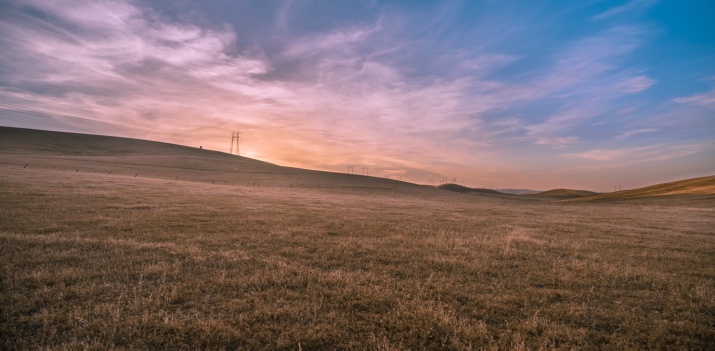
Prairie sky – public domain photo by Joseph Barrientos
Trespassing Across America is both a travel memoir and a reflection on climate change. At the time of writing, plans for the Keystone XL pipeline were in progress, but they were rejected by President Obama in November 2015. Keystone XL was highly controversial from an environmental perspective. It would have increased tar sands production methods and tar sands pipelines are vulnerable to leaks, putting agricultural land and water at risk in states like South Dakota and Nebraska.
At the beginning of the book, Ilgunas takes a trip to the Alberta tar sands in Canada, where bitumen (which is refined into oil) is mined, and witnesses the environmental destruction that it entails. You can see photos and read his blog post about it here: Day 7: The Tar Sands of Alberta.
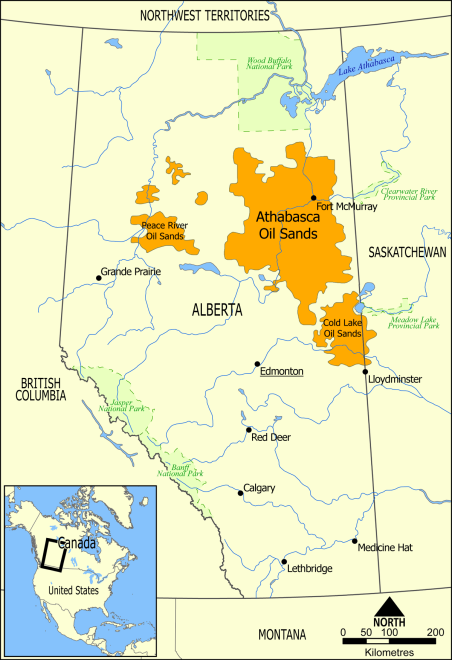
Athabasca Oil Sands, Alberta. By Norman Einstein – Own work, Public domain, Wikimedia Commons
The tar sands mean that vast swathes of boreal forest must be cut down, turning the land into a barren wasteland, and the mining process emits millions of tons of carbon dioxide into the atmosphere. That isn’t the only issue: because the water table reaches the surface in most areas of muskeg (peat bog), oil sand development leads to contaminated and polluted water.
Communities near the “tailing ponds” where the toxic sludge is stored are beset by health problems, and a whopping three million gallons of sludge is leaking into the Athabasca river everyday, causing havoc to the ecosystem and wildlife habitats. It’s sobering stuff to read about, especially when trying to change the course that we are collectively taking feels like a Sisyphean task.
Many of us try to do our bit for the environment, but single efforts can feel rather insubstantial — like an ant trying to push a boulder up a mountain — especially when you encounter people who flatly deny climate change or that the oil industry is negatively affecting our planet.
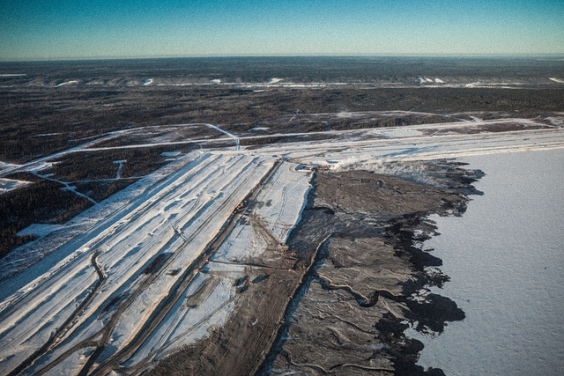
An aerial view of one of the Alberta tar sands tailing ponds. Image by Kris Krüg. Available under Creative Commons License CC BY-NC-ND 2.0
A major point that Ilgunas observed supporters citing in favour of the pipeline is the creation of jobs. There’s big money in oil, but as Ilgunas points out, is it really worth it if the jobs themselves are soul-destroying? Despite the high pay, many oil pipeline workers have to live far away from their families for months. Alcohol and drug use are very real issues, along with other social problems such as domestic violence. And if the Keystone XL pipeline had gone ahead, it would have created a mere 35 permanent jobs after the pipeline had been built.
Ilgunas writes with a refreshingly open-minded stance. He is an environmental supporter (and with good reason), but he acknowledges that being anti-oil is hard in a world which is currently reliant on it. As he says in this blog post from Day 10 of his trek, “all my gear has petroleum in it, and the food I bought has been made or transported with oil. How could I possibly get food and gear with no trace of petroleum? It’s darn-near impossible”.
There is always a risk of being labeled “preachy” or “santimonious” when talking about climate change issues. But Ken Ilgunas doesn’t come across as having a holier-than-thou attitude. His writing is very likable, and this is a thought-provoking book written with humour and sincerity.
Trespassing Across America: One Man’s Epic, Never-Done-Before (and Sort of Illegal) Hike Across the Heartland will be released April 19, 2016 — published by Blue Rider Press.
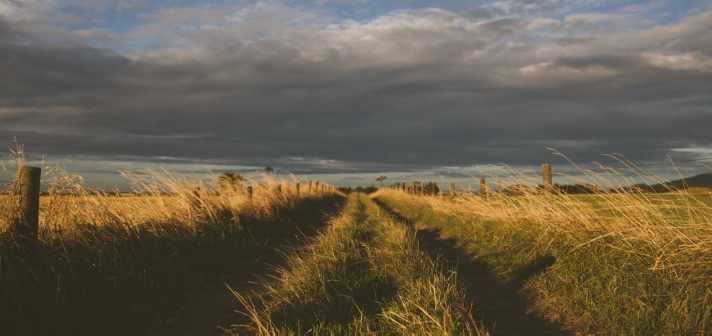
“Great plain” – public domain photo by Taylor Leopold
Disclaimer: I received an advance reader copy from Netgalley in exchange for an honest review.

I am from Alberta and was very much opposed to the pipeline. Alberta made a lot of money (which was terribly mismanaged by several provincial governments) from the oil sands, but the fact is that the oil companies were the ones who were really running the province. We need to drop our dependency on oil and develop clean energy.
Btw, you can walk across Alberta – as a matter of courtesy it’s understood that you will just let the landowner know that you’re doing so. There’s also a lot of publicly owned (“crown” land) that a hiker can use. It’s discouraging to learn that that’s a difficult prospect in the US.
Good post. 🙂
LikeLiked by 1 person
I was horrified when I read about the environmental destruction that the oil companies have caused in Canada. It’s very disturbing, and it’s fortunate that the pipeline was vetoed last year.
It’s nice to hear that Alberta is friendly towards hikers. Thanks for commenting. 🙂
LikeLike
I have a theory about the abundance of “no trespassing” signs, which is the same as when I see people put up “no parking” signs in a residential area which, I might add, aren’t official signs recognized by the local authorities– basically I think it’s just an extension of the free speech amendment that so many people love to bring up as justification for their actions. And I’m sure the people who put up those signs would say that it’s their “right” to protect their privacy or land, particularly if they do actually own parts of it. That being said, it’s discouraging to hear about the prevalence of this.
I will say though, that for those of us living on the coasts, we’re so far removed from the vast middle of America that we often forget (or don’t even know) what the rest of the country is like. And then by extension, we also don’t know much about the culture of middle America, which people on both coasts are prone to dismissing as being “uninformed” and “close-minded.” But that’s likely another discussion for another day. This book sounds really interesting and I’d love to add it to my to-read list, as soon as I manage to finish another book that I’m currently in the middle of. So many things to absorb, so little time!
LikeLiked by 1 person
Your theory sounds very likely, in the same way that a lot of Americans cite their “right” to bear arms. I try to keep my blog politically neutral, but the U.S. gun control issue is mind-boggling to someone from a country with strict gun laws and where gun violence is practically non-existent.
From an outsider’s perspective, middle America tends to be negatively stereotyped too. No doubt there is some truth in the stereotypes, as Ken Ilgunas found on his journey (he encountered a few people who believe climate change is a hoax thought up by the Democrat party), but it’s always best to keep an open mind. And that’s what came across in his writing — although he opposes oil, he recognizes that for many people in the boom towns, oil gives them a much-needed income to support their families.
What are you reading at the moment? I have so many books on my TBR list. I read as much as I can, but there’s never enough time. 🙂
LikeLike
The gun control issue is mind-boggling to many Americans, myself included, so I can only imagine how backwards or just plain weird it might seem to people from countries with strict gun policies. Sigh. But that’s another topic for another day haha.
I’m reading this book called Reclaiming Conversation by Sherry Turkle (whose work I was introduced to when I was studying in London). It’s a bit depressing since her general premise is that young people these days are losing the ability to have a real, in-person conversation thanks to technology and are turning into a bunch of robots who don’t know how to be empathetic. I exaggerate but you get the gist. Nevertheless it’s a great look into our society as a whole and makes you think how and where you stand on the whole technology/communication divide. It’s slow going on the book though because it’s dense stuff but I’ll get there eventually. 🙂
LikeLiked by 1 person
Having lots of English blogging friends, I’ve always been amazed at the open walking paths all over the country. Even if a property has a wooden fence, there is a little gate or step over provided for walkers. Growing up on a ranch in Texas, I just took fenced property for granted…it just kept animals from straying onto other peoples property. I guess you get used to what is familiar in the places where you live.
LikeLiked by 1 person
Definitely! There’s no shortage of footpaths and bridleways in the UK (especially in the many National Parks) although England doesn’t have the same legislation as Scotland. In Scotland, the “Right to Roam” act means that hikers can walk across almost any land, as long as they behave responsibly. There’s a strict countryside code of conduct: no littering, no camp fires etc. Have you ever visited Scotland?
The right to roam laws in Scotland and elsewhere in Europe don’t oppose fences to keep animals. But I think it’s a shame when walkers are prohibited from land if there is no reason for them to be.
Thanks for commenting. 🙂
LikeLike
I have been to Scotland and think it is one of the most beautiful countries that I’ve been to…it is so lush and green.
LikeLiked by 1 person
How interesting! I had no idea that other countries, like Switzerland, were so open and encouraging to hikers! It is definitely tough to hike long distances in America without trespassing.
This sounds like a fascinating and informative memoir!
LikeLiked by 1 person
It’s always interesting to hear about cultural differences, isn’t it? I was surprised to read about how difficult it can be to hike in the States unless you’re on a designated trail.
I definitely learned a lot from this memoir, and I enjoyed the author’s open-minded style. 🙂
LikeLike